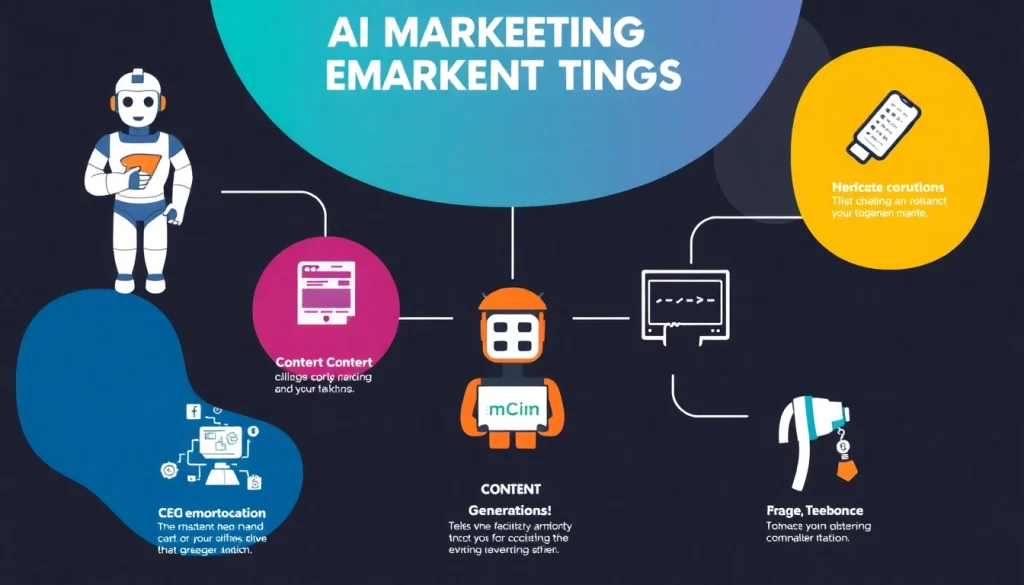Maximize Marketing Efficiency with Essential AI Marketing Tools

Understanding AI Marketing Tools
The Basics of AI in Marketing
Artificial Intelligence (AI) has become an essential element in marketing strategies across various industries. It refers to the simulation of human intelligence processes by machines, especially computer systems. These processes include learning (the acquisition of information and rules for using it), reasoning (using rules to reach approximate or definite conclusions), and self-correction. In marketing, AI tools help businesses automate their processes, gain insights into customer behavior, and enhance personalization in their campaigns.
AI marketing tools leverage massive datasets to perform tasks such as predicting trends, optimizing campaigns, and enhancing customer engagement. Businesses that adopt AI make data-driven decisions, allowing for more effective targeting of their marketing efforts. As market dynamics continually evolve, understanding the scope of AI in marketing is crucial for any business looking to stay competitive.
How AI Tools Transform Marketing Strategies
AI tools can fundamentally change how organizations approach their marketing strategies. With capabilities in data analysis, customer segmentation, and content creation, these tools allow marketers to:
- Analyze vast amounts of data to identify trends and insights.
- Automate repetitive tasks such as email campaigns and social media postings.
- Create personalized content based on user behavior and preferences.
- Optimize marketing campaigns in real-time based on customer interactions.
For instance, platforms like AI marketing tools allow businesses to refine their strategies by continuously learning from data, ensuring that aggregated insights translate into actionable marketing strategies. As a result, marketers can enhance efficiency and drive better outcomes.
Key Benefits for Your Business
The integration of AI marketing tools provides numerous benefits:
- Enhanced Efficiency: Automating repetitive tasks frees up time for marketers to focus on strategic planning and creative work.
- Improved Customer Insights: AI tools analyze customer behavior, offering deeper insights that can inform targeting and segmentation strategies.
- Personalization: AI enables the creation of personalized marketing campaigns tailored to individual customer preferences and behaviors, resulting in higher engagement rates.
- Data-Driven Decisions: With access to robust analytics, businesses can make informed decisions that lead to improved campaign performance and ROI.
Top AI Marketing Tools to Consider
Chatbots for Customer Engagement
Chatbots have revolutionized the way businesses interact with their customers. Utilizing natural language processing, these AI-driven tools provide real-time responses to customer inquiries through websites, social media platforms, and apps. They assist in addressing customer concerns, providing information, and even guiding users down a conversion path.
For businesses, chatbots offer:
- 24/7 customer service: Ensuring customers receive assistance at any time of day.
- Cost-effective support: Reducing the need for large customer support teams.
- Data collection: Gathering valuable insights from customer interactions to improve services.
Tools like Drift and Intercom are popular choices, allowing companies to streamline customer engagement and improve satisfaction rates significantly.
Content Creation Tools for Streamlining Workflows
Creating high-quality content is essential for any successful marketing strategy. AI-powered content generation tools help marketers by automating the writing process, generating ideas, and optimizing existing content for SEO purposes. Tools like Jasper and Copy.ai leverage advanced machine learning algorithms to assist writers in crafting compelling content while saving time.
The benefits of using these tools include:
- Speed: Rapid content generation without sacrificing quality.
- Consistency: Maintaining a uniform tone and style across various pieces of content.
- SEO Optimization: Ensuring that content is tailored for visibility across search engines.
Predictive Analytics for Data-Driven Decisions
Predictive analytics utilizes AI and machine learning techniques to analyze historical data, allowing businesses to forecast future outcomes. By understanding consumer behavior patterns, marketing teams can tailor their strategies to meet predicted demands and optimize resource allocation.
Key advantages include:
- Informed Strategy Development: Data-driven insights lead to more effective marketing campaigns.
- Risk Mitigation: Anticipating market changes helps businesses adjust strategies before potential issues arise.
- Increased ROI: Allocating resources to high-potential areas based on predictive insights drives improved returns on investment.
Integrating AI Tools Into Your Marketing Strategy
Steps for Implementation
Successfully incorporating AI marketing tools into your strategy involves several key steps:
- Assess Your Needs: Identify your marketing pain points and determine how AI can address them.
- Research Available Tools: Conduct in-depth research on the best tools that fit your requirements and budget.
- Plan for Integration: Develop a detailed plan for how these tools will integrate with your existing marketing stack.
- Training Staff: Ensure your marketing team is adequately trained to use these tools effectively.
- Monitor and Optimize: Continuously track the performance of your AI tools and make adjustments as necessary.
Measuring Success and Performance Metrics
To evaluate the effectiveness of AI marketing tools, it is crucial to establish clear performance metrics. Some relevant metrics include:
- Conversion Rates: Measure how many leads are turning into customers.
- Engagement Metrics: Assess customer interactions with your content, such as click-through rates and time spent on site.
- Return on Investment (ROI): Calculate the overall returns generated from your marketing campaigns against the costs incurred.
- Customer Satisfaction Scores: Use feedback to gauge customer perceptions and satisfaction with your service.
Adaptation and Continuous Improvement
The marketing landscape is ever-evolving, and to remain competitive, businesses must adapt their strategies continuously. Utilizing AI marketing tools provides the data necessary for ongoing optimization and innovation. Regularly review performance metrics, assess new technologies, and be willing to pivot based on data-driven insights. Embrace a culture of continuous improvement to ensure long-term success.
Case Studies of Successful AI Tool Applications
Business A: Leveraging AI for Customer Insights
A leading retail company utilized AI-driven analytics tools to segment their customer base more effectively. By analyzing purchasing patterns and customer feedback, they created targeted marketing campaigns for different customer segments. This resulted in a 30% increase in year-over-year sales, demonstrating the power of data-informed decisions.
Business B: Streamlining Content Marketing with AI
A digital marketing agency adopted AI content generation tools to enhance their content marketing efforts. They deployed a platform that generated topic ideas and drafts, allowing their team to focus on refining and editing rather than initial creation. This led to a 40% increase in content output, improved client satisfaction, and reduced workload for their team.
Lessons Learned from Industry Leaders
Successful implementation of AI marketing tools often shares commonalities:
- Data is Essential: Companies that prioritize data collection and analysis tend to experience more significant benefits.
- Integration is Key: Seamless integration with existing systems enhances user experience and efficiency.
- Engagement matters: The most successful businesses actively seek feedback, allowing them to make iterative improvements.
Future of AI Marketing Tools
Trends to Watch in AI Technology
As AI technology evolves, several trends are likely to impact the marketing landscape:
- Personalization at Scale: AI will enable even more sophisticated levels of personalization, providing each customer with a tailored experience.
- Voice Search Optimization: With the rise of voice assistants, optimizing for voice search will become increasingly important.
- Augmented Reality Integration: AI can enhance AR applications, creating immersive marketing experiences.
Preparing for Tomorrow’s Marketing Solutions
As businesses navigate advancements in AI technology, preparation is key. Organizations should invest in training their teams, stay informed of emerging trends, and be proactive in experimenting with new tools. Building a flexible marketing strategy that can adapt to evolving technologies will ensure long-term success.
Final Thoughts and Recommendations
The integration of AI marketing tools offers an unprecedented opportunity for businesses to enhance their marketing strategies and drive growth. The benefits of automation, analytics, and improved customer engagement highlight the necessity of incorporating these technologies into modern marketing efforts. By continuously learning and adapting to new advancements in AI, businesses can position themselves to thrive in an increasingly competitive marketplace.






